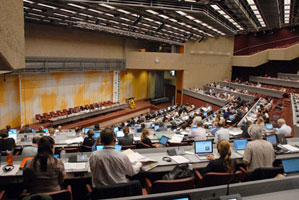For use of the media only;
not an official document.
Peru’s progress in the regulation of mahogany trade also welcomed
and the estimated black market price of rhino horn rectified
Geneva, 26 August 2011 – The Secretariat of the Convention on International Trade in Endangered Species of Wild Fauna and Flora (CITES) has announced today the withdrawal of a recommendation to suspend trade with Nigeria that had been in place since 2005 because of increasing illegal wildlife trade and a lack of adequate enforcement.
 |
| 61st meeting of the Standing Committee, Geneva, Switzerland |
The decision to lift the suspension was adopted during the 61st meeting of the CITES Standing Committee held in Geneva last week (SC61). Nigeria has designated the National Environmental Standards and Regulations Enforcement Agency (NESREA) as the country’s new CITES enforcement authority and has enacted new wildlife regulations that fully comply with CITES requirements and can now be ranked in Category 1 under the CITES legislation project.
“The Government of the Federal Republic of Nigeria under Dr. Goodluck Ebele Jonathan, GCFR, is dedicated to its transformation agenda. We are determined to pursue, with renewed vigour, the drive towards fulfilling Nigeria’s obligation under CITES and the myriad of other conventions to which Nigeria is Party”, said Ms Ngeri S. Benebo JP, Head of Nigerian Delegation at SC61.
CITES Secretary-General John E. Scanlon said: “the determination, enthusiasm and political will that Nigeria has demonstrated, in particular over the past year, is worthy of recognition and appreciation. We are encouraged by the strong ongoing commitment to implement the Convention shown by the Government of Nigeria.”
Peruvian approach for mahogany recognized as an example
The Committee has also recognized progress made by Peru during the past six years to establish restrictive timber export quotas and reliable verification systems to ensure that harvest is sustainable and trade legal. Peru is no longer the main exporter of mahogany as Guatemala, Bolivia and Mexico are now the three major exporters of this precious timber. The lessons learnt from the Peruvian model could be applied to other mahogany range States in the future.
Black market price of rhino horn
Mr Øystein Storkersen, Chair of the CITES Standing Committee, wishes to clarify that the estimated price of a kilo of rhino horn on the illegal market is below USD 50,000. The confusion generated during last Friday’s media briefing relates to currencies, as he was calculating in Norwegian Krone rather than US dollars.
CITES further agreed to lift a recommendation to suspend trade in Himalayan yew (Taxus wallichiana) from India, a tree that has important pharmaceutical uses.
Note to journalists: For more information, contact Juan Carlos Vasquez à +41 22 917 8156 or 41 79 552 27 32 (mobile), or juan.vasquez@cites.org.
![]() To read previous press releases, go to Archives.
To read previous press releases, go to Archives.